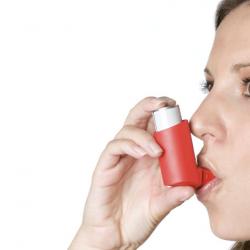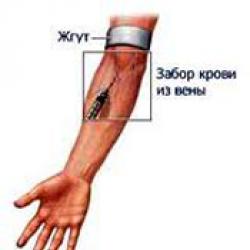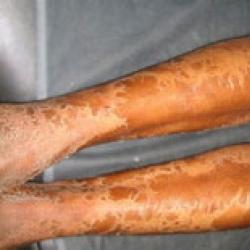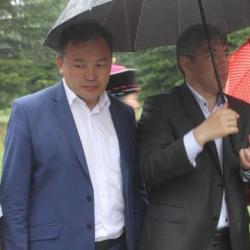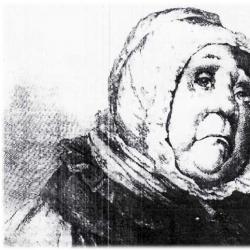Brief biography of Lech Walesa. Walesa lech - biography of Walesa and Polish-Israeli relations
| Lech Walesa | |
| Lech Walesa | |
| Portrait | |
| Lech Walesa in 2009 | |
|---|---|
| Occupation: |
Politician, President of Poland |
| Date of Birth: | |
| Place of Birth: | |
| Citizenship: | |
| Awards and prizes: | |
Lech Walesa(Lech Wałęsa, born September 29, 1943 in Popovo, near Wloclawek, Poland) - Polish politician, the first president of Poland after the liquidation of communist power (1990-95).
Biographical information
In 1976 he became a trade union activist and was fired. In 1980, he led the strike of the Gdansk shipyard, and then the strike committee of the Gdansk-Sopot-Gdynia agglomeration. As a result of the victory of the strike, the communist government of Poland agreed to the existence of the independent Solidarity trade union, which was not controlled by the authorities. Walesa became its head.
After the introduction of martial law on December 13, 1981, Walesa was arrested and spent almost a year in prison. After his release, he continued to head the trade union, which worked illegally.
He received the Nobel Peace Prize in 1983.
In the process of the collapse of communist power, Solidarity became a political party and won enough seats in the Sejm in the 1989 elections to form a government.
In 1990, Walesa was elected president, after which he held the first normal parliamentary elections (1991) and supported economic reforms for the country's transition to a free market.
In 1995 and 2000 he lost the elections.
Walesa and Polish-Jewish relations
Before the collapse of communism
In the last years of communist power in Poland, Walesa was involved in the elimination of recurrences of anti-Semitic policies in Poland. The Catholic Church opened a nunnery on the territory of the former death camp Auschwitz.
The Jewish communities believed that this monastery should not be located on the territory of the camp, as this would help to obscure the historical fact, so as not to help the Polish authorities gloss over the fact that the main victims of the Nazis were Jews.
The leading Catholic hierarchs of Western Europe joined the protest of the Jewish communities. The high-level meetings in Geneva in 1986 and 1987 were held with the participation of the four cardinals on the Catholic side and the leaders of the Western European communities on the Jewish side. The Catholic Church decided to move the monastery to a new information center outside the Auschwitz camp. But even two years later, the monastery was still not translated: the Catholic community in Poland stubbornly resisted.
American Rabbi A. Weiss and six of his associates, dressed in the uniform of concentration camp prisoners, staged a demonstration in the monastery and were forcibly removed from there. In response, Cardinal Machajsky announced the cancellation of the agreement on the transfer of the monastery, and the Archbishop of Warsaw, Cardinal Glemp, in front of 100,000 Catholics who had gathered in Czestochowa, and in the presence of the Prime Minister of Poland, read a sermon in which he called on the Jews "not to speak with us from position of a superior nation and not dictate conditions that cannot be met” and made standard anti-Semitic attacks.
Cardinal Glemp's statements were condemned not only by Jews, but also by many Poles. Lech Walesa called them shameful.
In post-communist Poland
After the collapse of communism, anti-Semitic traditions in Polish politics returned to their original level. L. Walesa tried to dissociate himself from involvement in this, but he himself sometimes made anti-Semitic statements.
The leaders of the Freedom Union party in the 1990s, among other things, wrote about L. Walesa that his real name was Leiba Cohen.
After the split of Solidarity in 1990, supporters of L. Walesa accused his opponent, Prime Minister T. Mazowiecki, of being the head of the "Jewish government" and himself being a "hidden" Jew. At the same time, the fact was emphasized that among the activists of the Solidarity faction that supported Mazowiecki, there were two Jews: A. Michnik - the editor of the Solidarity organ "Gazeta Wyborcza" and B. Geremek (born in 1932). During the election campaigns of 1990 and 1991. on the posters of this faction of Solidarity, the word "Jew" was often written.
Speaking at the Solidarity congress in 1990, Walesa repented that in the fight against communism he was forced to cooperate with "intellectuals and Jews."
During the presidential election campaign in 2000, he declared that A. Kwasniewski had no right to make a pilgrimage to the Vatican, since he was of Jewish origin.
Walesa and Polish-Israeli relations
In 1991, Walesa paid an official visit to Israel. On May 20, 1991, he delivered a speech in
Walesa Lech (born 1943), Polish statesman and public figure, President of Poland (1990-1995).
Born on September 29, 1943 in the town of Popovo near Wloclawek in a peasant family with aristocratic roots. In 1961 he graduated from the school of agricultural mechanization, worked as an electrician in the State Center for the Operation of Machines (1961-1967) and as an electrician at a shipyard in Gdansk (1967-1976). During the mass strike in Gdańsk (December 1970), Walesa was the leader of the strike committee, for which he was persecuted.
Then he worked in the Gdansk association "Electromontazh", participated in the strikes of 1976, was one of the organizers of semi-legal free trade unions (1978). In August 1980, Walesa led a strike at the Gdansk shipyard, and in 1981 he became the leader of Solidarity, a federation of workers' unions that replaced the government-controlled trade unions.
After the introduction of martial law in Poland and the transfer of power to the Military Council of National Salvation under the chairmanship of General W. Jaruzelski (December 1981), the activities of Solidarity were banned, and Walesa was placed under house arrest (December 1981 - November 1982) .
Until the end of the 80s. Walesa was one of the most prominent figures in the Polish political opposition. In October 1983 he was awarded the Nobel Peace Prize. In 1988, a new wave of strikes took place in the country, prompting the government to call free parliamentary elections, which took place in June 1989 and brought victory to the Solidarity candidates.
In October 1990, President Jaruzelski was forced to resign, and in December of the same year, Walesa won a snap presidential election.
As president, he supported the course of market reforms and the creation of a strong presidential power. Nevertheless, in September 1993, a coalition of left-wing parties won the majority in parliament, and A. Kwasniewski was elected president in the November 1995 elections.
Recently, Walesa has been giving lectures at US universities.
In October 2000, he put forward his candidacy for the presidency of Poland, but lost the election.
Lech Walesa is a Polish politician, activist and defender of human rights, the first head of the independent trade union Solidarity. Electrician by profession.
The son of a carpenter, born on September 29, 1943 on the territory of the Pomeranian Voivodeship annexed by Nazi Germany, Walesa worked as an electrician at the Gdansk shipyard. In 1980, he created the first free trade union in Eastern Europe, not controlled by the state - Solidarity.
Wałęsa's sacking for union activism, along with food shortages and rising prices, led to strikes in 1980 and 1981 that generated widespread support for Solidarity in various sectors of society and forced the government to make a number of concessions, including granting workers the right to organize freely. to trade unions.
On the night of December 13, 1981, the regime of General Wojciech Jaruzelski introduced martial law and outlawed Solidarity. In the very first days of martial law, more than 3,000 leading activists - including Walesa - were detained and sent to internment centers. Along with most of the internees, Walesa was released on November 14, 1982.
Winner of the Nobel Peace Prize in 1983 for his work in support of workers' rights.
On September 30, 1986, under the chairmanship of Walesa, the Provisional Council of Solidarity was established. The reconstruction of regional trade union centers has begun. The authorities did not formally sanction the legalization of Solidarity, but in general they did not create insurmountable obstacles. On October 25, 1987, a group of activists formed the National Executive Committee of Solidarity. It was led by Walesa. This structure consolidated that part of the opposition that was ready for negotiations with the authorities. At the same time, many activists stood for the positions of Fighting Solidarity and advocated an uncompromising struggle against the regime.
As a result of the mass strike movement in the spring and summer of 1988, the leadership of Poland was forced to take a course towards a compromise with Solidarity. On August 25, 1988, Minister of the Interior Czeslaw Kiszczak met with Walesa in the presence of the representative of the Polish episcopate, Abbot Aloysius Orshulik. Walesa played a major role in negotiations with the government in 1988 (conversations in Magdalenka) and 1989 (Round Table). Their result was the legalization of Solidarity and the holding of semi-free parliamentary elections in June 1989, in which Solidarity won 99 out of 100 seats in the Senate.
The elections were perceived by society as a crushing defeat for the regime. On August 7, Walesa announced the readiness of Solidarity to take over the leadership of the government. Walesa's negotiations with the leadership of the United Peasant and Democratic Parties (long-term satellites of the communist regime) led in the current situation to their support for Solidarity. On September 7, the first non-communist government of Poland came to power, headed by the representative of Solidarity, adviser to Walesa, Tadeusz Mazowiecki.
In the 1990 presidential election, Walesa, after an impressive victory, was elected President of Poland in the second round, gaining 74.25% of the vote. He faced the difficult problems of political instability and Poland's transition to a free market economy.
In 1995, Walesa lost the election to Aleksander Kwasniewski. In the first round, he took second place with 33.1%, in the second round he scored 48.3%.
In the 2000 presidential election, Walesa won 1.4%.
On September 29, 2006, Lech Walesa announced his intention to return to politics and create a new party. He stated: “People who once fought for the independence of Poland cannot accept what is happening now. We didn't fight for the likes of Kaczynski, Lepper or Gertych."
In an interview with TVN 24, which aired on March 1, 2013, Lech Walesa said that homosexuals in parliament should be seated separately from other deputies and even behind a wall. For these words, he was criticized by some deputies of the Seimas.
In connection with the Crimean crisis, in an interview with the newspaper Rzeczpospolita, Walesa said the following: "Putin should be tried in The Hague."
Lech Walesa is one of the brightest figures in contemporary Polish politics and history. The figure, the debate about the role and significance of which in the political life of Poland has not subsided so far. Polish historians, as well as foreign ones, at the moment cannot say who exactly Walesa was and what role he played in history. In the 80s and 90s, the reputation of the president as an electrician was undeniable: he was the one who liberated Poland from the communists and the influence of Russia. But now, in an attempt to close the gaps in the politician's biography, young Polish historians are raising the question of the possibility of Lech Walesa's cooperation with the secret services of communist Poland. The “little corporal” loses the status of the leader of the nation and is popularly referred to simply as Bolek. Presumably, it was under this code name that Walesa was recruited. Only 20 years after the departure of Lech Walesa from big politics, it is difficult to say exactly who he was, and whether his "Solidarity" was a well-played "theatre" or was it a pan-Polish "revolution". But one thing is for sure: it was the electrician from the Gdansk shipyard who became the personification of the dissatisfaction of the Polish people with the policies of the Communist Party. Lech Walesa became the political leader of the labor movement; in his authority, he surpassed the leaders of the Communist Party, which was no longer a representative of the interests of the working people.
Lech Walesa was born on September 29, 1943 in the small village of Popovo. His father died in a concentration camp and his father's brother became his stepfather. Lech hated his stepfather and even in adulthood often called him a miser. “A rift in the family hung over my entire childhood and later life,” he recalled. But it was early orphanhood, good health and strong nerves, the feeling of a master, men in the family that became the basis for the formation of a self-confident personality in the future, who was able to realize her ambitions.
Even at school, Lech proved himself to be an excellent organizer. Teachers remember Walesa as a man of quick intellect, but his concentration and perseverance left much to be desired. The future president often admitted that teachers at school broke more than one pointer on his head. Immediately after graduation, he left for the nearest large city - Lipne. Here he was educated as a mechanic and later as an electrician. In 1964, he began a two-year military service, graduating with the rank of corporal.
"Little Corporal" is a nickname in the future for a long time to gain a foothold for Walesa. After the service, he ended up in the city with which his whole life would be connected in the future - Gdansk. In 1967, Lech Walesa found a job at the rapidly growing Lenin Shipyard. Familiar Walesas of those times remember him as an energetic, witty young man, but absolutely not interested in politics.
The most famous Polish electrician from a very young age carried several key principles in himself: he was a staunch Catholic, instinctively “did not like Russians”, in principle, like many Poles, and did not trust socialist propaganda. Probably, he did not even know the main tenets of the Marxist-Leninist ideology, however, at a certain moment their mottos coincided, in the private “The leading role of the working class”.
It is to this motto that the leader of Solidarity has remained faithful for two decades. As a shipyard worker, Walesa found himself among the labor aristocracy, as its workers earned the most in heavy industry, but their working conditions were terrible. Walesa describes the shipyard as follows: "It was a manufactory, through which we walked like chimney sweeps and ragamuffins, without a single chance to wash and relieve our natural needs."
Shortly after the employment of Lech Walesa, 21 electricians died in an accident caused by unsuitable working conditions. The future president himself did not suffer, but for himself he forever decided that it was impossible to stay away from the problems of the workers. After that, Walesa began to openly criticize the official trade unions, accusing them of representing the interests of the administration rather than the workers. After one of the hot performances, Walesa was fired. The rise in prices in the summer of 1980 caused a wave of unrest among the workers. In Gdansk, the center of the strikes was the shipyard named after Lenin.
Here, on August 14, an attempt was made to organize a new strike demanding the return to work of Anna Valentinovich, a prominent figure in the trade union movement, and an increase in wages by a thousand zlotys. The appeal was initially supported by just over 100 people, and besides, after a series of conditional concessions, "the crowd began to waver." The strike scenario was radically changed by the appearance of Lech Walesa.
The little electrician was still a popular personality at the shipyard, and the crowd cheered when he called for an occupation strike. The appearance of Walesa unequivocally saved the strike from defeat.
A strike committee was elected, and the demands of the strikers were amended. A fundamentally new requirement was the construction of a monument to the victims of December 1970. The workers occupied the territory of the shipyard, created security detachments and introduced prohibition. The strike committee was expanded to include the older generation, who were ready to confine themselves to purely economic demands. On August 15, the strike spread to other businesses in the city. On August 16, the directorate offered the workers of the striking shipyard a 1,500 złoty salary increase, which was accepted by the majority of the strike committee. Walesa threw up his clenched fist and shouted "we won." After that, most of the workers went to the exit, but in the remaining crowd there were cries of "traitor" and "corrupt". The protesters turned out to be representatives of other striking enterprises of the city. "If you leave us, they won't leave us anything." Under their pressure, Walesa changes her mind and calls for the continuation of the strike as a "solidarity strike". It is at this moment that Walesa is born as a leader and leader of the workers. Throughout the days of the strike, Walesa continues to play a key role. Outwardly, this was expressed in the fact that after the daily mass, which, with the consent of the authorities, since August 17, the priest Yankovsky served in the courtyard at the main gate, he climbed onto the truck and began his evening conversation with those gathered, both from the other side of the gate. On the ground, he seemed a slightly comical figure, moving like Charlie Chaplin, fast and nervous. It is this comicality that is one of the reasons for the popularity of Walesa. He was one of them, he was the embodiment of the "little man" - the Polish worker. And, besides, he spoke their language, and not the memorized words of apparatchiks. Every day during his evening talks, he told those present in simple words about the successes achieved in the struggle against the authorities.
In Lech Walesa, the workers found a leader they fully trusted. Later, the leader himself will write about this: “I was smart enough for them, they didn’t want smarter. This one would have stood over them, and they were fed up with this. It is he who these days becomes the symbol of the struggling working class. L. Vadkovsky, a Gdansk writer, explaining this phenomenon, connected it with the social "need for moral guidance." By the introduction of martial law on December 13, 1981, Solidarity was not ready. At the moment of his arrest, the solidarity leader abandoned his moderate demands and said emphatically: "By acting like this, you will lose, this will be your end and the end of communism." For the house arrest of Walesa, a government villa was chosen, the same one that once became a haven for V. Gomulka. Cut off from information, deprived of his advisers, the “little corporal” and in isolation showed a maximum of political intuition and endurance, proving to everyone that he was the true leader of the country.
- On November 12, 1982, Lech Walesa is released, trying to give him the status of a private person. The authorities failed to turn him into a private person. An attempt by M. Rakovsky, a key figure on the political scene of the PPR, to discredit the authority of Walesa at a meeting with workers in August 1983 ended in failure. He tried to ridicule and portray the leader of the Polish trade unions as a puppet in the hands of advisers. His actions turned against him, Rakovsky's reputation as a liberal and authoritative politician was lost.
- 1983 turned out to be an important milestone in Walesa's biography. During this time of crisis for Solidarity, he received serious moral support from the church (he was received by John Paul II), and from the world community (he was awarded the Nobel Peace Prize in the fall). 1984 - 1987 were a period of calm in the confrontation between parties and Solidarity. Despite the gradual loss of the opposition's prestige in society, during these years Walesa managed to consolidate the main forces that were in the Solidarity underground. He created the Provisional Council of Solidarity and recreated the All-Polish Executive Commission. His speeches during this period are full of propaganda of the need for a dialogue between the authorities and society and peaceful methods of struggle for democratization.
Another wave of unrest in the country at the end of the 1980s made a decisive "battle" for democracy inevitable. The first stage of this "movement" was an open televised debate between Lech Walesa and the leader of the pro-government trade unions A. Medovich. According to B. Geremek, the latter wanted the legend of Solidarity to be destroyed by its leader. Medovich promised his colleagues to make a "chop" out of Walesa. Live on November 30, 1988, watched by 20 million viewers, Walesa won the debate unconditionally. His social prestige rose so high that he once again became the most important political figure in the country.
There is no doubt that this personal victory of Lech Walesa forced the leadership of the party to negotiate at the Round Table. The negotiations were dictated by the "new Polish politicians" and gave impetus to democratic reforms in the country, culminating in the election of Lech Walesa as President of Poland on December 9, 1990. He received his presidential regalia from R. Kacharovsky, the Polish president in exile. Lech Walesa is one of the most charismatic figures in modern European history. In the second half of the twentieth century, he became the leader and symbol of the events that “broke” communism not only in Poland, but throughout Central and Eastern Europe. The destruction of the foundations of the Warsaw Pact and the fall of the "red ear" is the direct merit of the leader of Solidarity. Recognized and respected throughout the world, Walesa is regarded as a person with democratic and Christian principles. A small and nondescript personality changed the history of the Polish Republic and helped realize the Poles' dreams of freedom.
The Polish economic reforms implemented 20 years ago had two fathers. The first is Lech Walesa, a populist politician, under whose decisive influence the transition from socialism to capitalism took place. The second is Leszek Balcerowicz, a brilliant economist who, in fact, prepared a plan for real transformations. Understanding what kind of people they are, in many ways means understanding what happened in Poland at the turn of the 80s-90s. XX century.
Lech Walesa (born September 29, 1943 in Popowo, Poland) is an activist who helped found and led (1980-90) the first independent trade union in communist Poland, Solidarity. million Polish workers became the country's president (1990-95). In 1983 he received the Nobel Peace Prize.
Lech Walesa: biography
During World War II in occupied Poland, Walesa's father Bolesław was interned in Lech before Lech was born, and in 1945 he died of exhaustion and beatings before he reached the age of 34. His mother Felix had a great influence on her son. The local priest remembers her as "the wisest woman in the parish".
Walesa was a mediocre student at the parish school, and then graduated from the state vocational school in Lipno, where he received the specialty of an electrician. From 1961 to 1965 he worked in the automotive service center.
For two years he served in the army, where he received the rank of corporal.
Shipyard electrician
In Lech Walesa, he began working as an electrician at a huge shipyard named after. Lenin in Gdansk. In 1970, he witnessed food riots during which several demonstrators were killed by the police. When new protests began in 1976 against Poland's communist leadership, he was featured as an anti-government trade union activist, causing him to lose his job.
In August 1980, when the Gdańsk shipyard was engulfed in protests over rising food prices, Lech Walesa climbed over the fence and joined the workers inside the plant, who elected him head of a strike committee empowered to negotiate with shipyard managers.
After 3 days, the demands were accepted, but when strikers at other enterprises in Gdansk asked Lech to continue the strike, he immediately agreed. He headed the interfactory strike committee, which united the enterprises of the Gdansk-Sopot-Gdynia region. The committee made a number of bold political demands, including the right to strike and the formation of free trade unions, and called for a general strike. Fearing a popular revolt, the communist authorities yielded to the main demands of the workers, and on August 31 an agreement was signed giving them the right to organize freely and independently. The signing was attended by Mieczysław Jagielski, First Deputy Prime Minister of Poland, and Lech Walesa. The biography of the leader of the trade union movement changed again: he was reinstated at the Gdansk shipyard and headed the National Coordinating Commission.

Solidarity
After some 10 million Polish workers and farmers joined semi-autonomous trade unions in response to this landmark agreement, the Interworks Strike was transformed into a national trade union federation with Walesa as its chairman and chief representative. In October, the Solidarity trade union was officially recognized by the Polish government, and Lech led the federation in confrontations with the authorities, limited by the possibility of Soviet military intervention.

Lech Walesa: Nobel Prize
The federation's victories proved to be ephemeral. In December 1981, the Polish government introduced martial law, Solidarity was outlawed and most of its leaders were arrested, including Lech Walesa, whose biography was replenished with a year in prison. The awarding of the Nobel Peace Prize to him in 1983 was criticized by the Polish government. Fearing an unwanted exile, he remained in Poland while his wife, Danuta Walesa, traveled to Oslo, the Norwegian capital, to accept the award on his behalf.

Election victory
As leader of the Solidarity underground movement, Walesa was subjected to constant harassment until another worsening of economic conditions and a new wave of labor unrest in 1988 forced the Polish government to negotiate with him and other trade union leaders. Their result was an agreement that renewed Solidarity's legal status and authorized free elections for a limited number of seats in the restored upper house of parliament. In June 1989, the movement won the vast majority of these seats, and after Walesa rejected an offer to form with the communists, the parliament was forced to approve a cabinet of ministers under the leadership of Solidarity, although its leader himself refused to be prime minister.

head of state
In 1989, Walesa helped his trade union colleague Tadeusz Mazowiecki become prime minister of that government, but ran against him for head of state in 1990 and won the first straights in the PPR by overwhelming majority.
How Walesa helped hold free parliamentary elections in 1991 and took part in the process of transforming the state's economy into a free market economy. He displayed remarkable political skills as the leader of Solidarity, but his simple speech, confrontational style, and refusal to ease strict abortion restrictions undermined his popularity at the end of his term in office. In 1995, he participated in the elections, but was defeated by the former communist Aleksander Kwasniewski, who headed the Union of Democratic Left Forces. Once again, Walesa ran for president in 2000, but received only a tiny fraction of the vote. In 1997, he founded and headed the political party "Christian Democracy III of the Republic of Poland".

Retirement from politics
As a result of the defeat in 2000, Walesa announced that he was leaving politics. Subsequently, he devoted most of his time to work at the institute named after him, which he founded in 1995 to disseminate information about the achievements of Solidarity, promote democracy and build civil society in Poland and in the world.
In August 2006, Walesa announced his resignation from the independent trade union in protest of his support for the ruling Law and Justice (PiS) party and Lech and Jarosław Kaczynski, twin brothers who once figured prominently in Solidarity and became the president and prime minister of the country, respectively. According to him, the organization has become alien to him, a different era has come, problems and people have changed. In particular, he opposed Kaczynski's dismissal of people associated with the former communist regime and PiS's attempts to make public the lists of members of the secret police from the era of the PPR.
Since 2004, the Gdansk Lech Walesa Airport has been operating. Squares and streets named after the former leader of Solidarity are located in the USA, Canada and France. In 2009, a monument was erected to him in the Alley of Polish Nobel Prize Laureates.
In 1981, he became the first Pole to be named Time Magazine's Person of the Year. From the hands of Queen Elizabeth II of Great Britain, Lech Walesa received the title of Honorary Member of the Order of the Bath. He was also awarded many orders and medals of foreign countries, including the US Presidential Medal of Freedom, the French Legion of Honor, the Order of Merit of the Italian Republic, the Swedish Order of the Seraphim, the Danish Order of the Elephant, the Finnish Order of the White Rose, the Portuguese Orders of Liberty and Infanta Don Enrique, the Norwegian Order of St. Olav, the Ukrainian Order of Prince Yaroslav the Wise, the Czech Order of the White Lion, the Order of Merit for the Federal Republic of Germany, the Chilean Order of Merit, the Estonian Order of the Cross of the Land of Mary, the UNESCO medal, etc.

Personal life
On November 8, 1969, Lech Walesa married Danuta Golos. The couple had 8 children: Bogdan (1970), Slavomir (1972), Przemyslav (1974), Yaroslav (1976), Magdalena (1979), Anna (1980), Maria Victoria (1982) and Brigida (1985). Jaroslav Walesa also became a politician and was a member of the Seimas in 2005-2009, and since 2009 he has been elected a member of the European Parliament.
In 2008, Lech Walesa underwent coronary artery stenting and a pacemaker was installed.
Agent Bolek
For decades, the former Polish president has been accused of being an informer for the communist secret services in the 1970s, despite his strong objections and a special court ruling in 2000 clearing him of collaborationist charges. However, the hype around these claims rose again in 2008. Then a book was published, the hero of which was Lech Walesa. The biography of the trade union leader was supplemented by facts indicating that from 1970 to 1976 he worked as a security operative under the code name Bolek. The issue resurfaced in February 2016, when the Institute of National Remembrance, tasked with investigating the Nazi and Communist era in Poland, seized materials from the widow of a former interior minister that showed Walesa was a security informant. Among other things, they found his obligation to cooperate with the Security Council, handwritten receipts for receiving money, a personal file and reports on the cooperation of secret agent Bolek. Lech Walesa himself rejected the possibility of the authenticity of the documents and suggested that records confiscated from him during the search could appear here.

